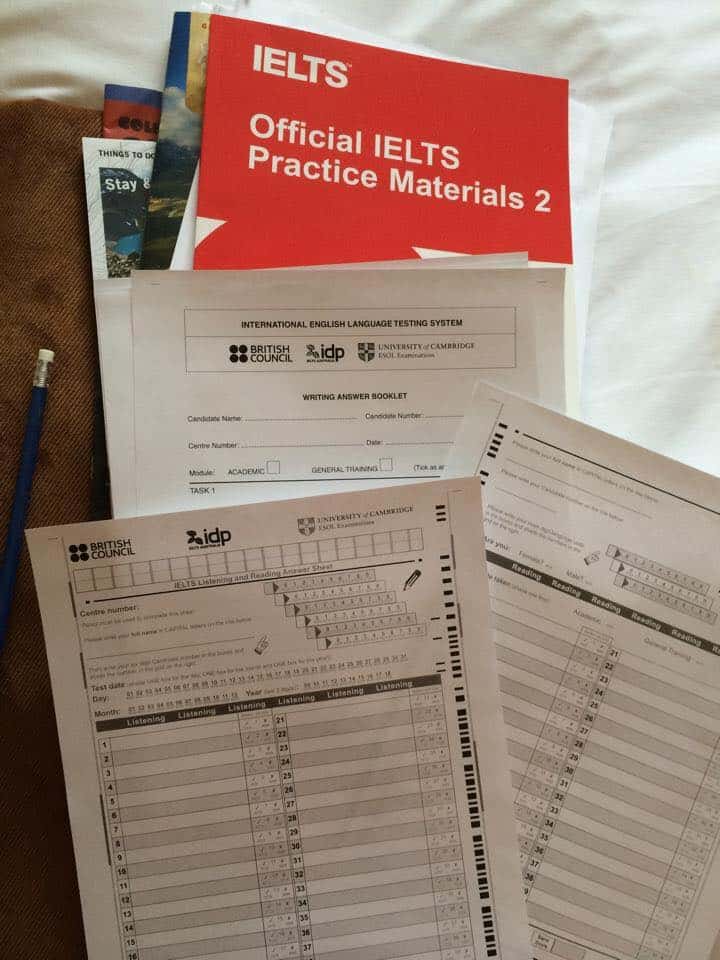Are you about to take the IELTS Test? Ielts Listening worries you the most because you know nothing about it? So what do you need to know to master IELTS Listening? This article presents key facts about IELTS Listening, essential tips, and skills to get a high IELTS Listening score.
Key facts about IELTS Listening
|
Ordinal number |
Key facts | |||||||||||||||||||||||||
|
1 |
Listening test format |
|
||||||||||||||||||||||||
| 2 | Your task |
|
||||||||||||||||||||||||
| 3 | No. of sections | 4 (with 10 questions each). The questions are designed so that the answers appear in the order they are heard in the audio. | ||||||||||||||||||||||||
| 4 | Section 1 | A conversation between two speakers set in an everyday social context, e.g. a conversation about travel arrangements | ||||||||||||||||||||||||
| 5 | Section 2 | A monologue about a daily topic, e.g. a speech about local facilities | ||||||||||||||||||||||||
| 6 | Section 3 | A conversation among 2 to 4 speakers set in educational or training contexts, e.g. a discussion between two university students | ||||||||||||||||||||||||
| 7 | Section 4 | A monologue about an academic topic, e.g. a university lecture. | ||||||||||||||||||||||||
| 8 | Timing | 30 minutes (plus 10 minutes for you to transfer your answers to the answer sheet). | ||||||||||||||||||||||||
| 9 | No. of questions | 40 | ||||||||||||||||||||||||
| 10 | Task types | There are 6 typical types of questions:
|
||||||||||||||||||||||||
| 11 | Answering procedure |
|
||||||||||||||||||||||||
| 12 | Marking |
|
||||||||||||||||||||||||
| 13 | Band Score |
|
||||||||||||||||||||||||
| 14 | How Ielts Listening is marked |
|
||||||||||||||||||||||||
| 15 | Marking criteria |
|
||||||||||||||||||||||||
| 16 | Level of difficulty | Normally, the level of difficulty of the sections increases as the test progresses. Therefore, the first ten questions usually are the easiest, the last ten questions tend to be the hardest. | ||||||||||||||||||||||||
| 17 | Accent | IELTS is an international test. This means that there might be a variety of accents used in the recording. However, British and Australian are still the two main ones. | ||||||||||||||||||||||||
| 18 | Spelling | Ielts accept either British English or American English spelling. | ||||||||||||||||||||||||
| 19 | Pen | Use pencils to write your answers on the answer sheet. Don’t use pens. | ||||||||||||||||||||||||
IELTS Listening Essential Tips
1. Do not miss any keyword
Firstly, it is essential for you to know the definition of keywords. Keywords are words that tell you about the main idea or subject of something.
The recording will be played only once, so you won’t hear it for the second time. Therefore, you need to listen to the recordings very carefully, do not miss any keyword. It means you need to focus only on the keywords which can be the answers, don’t try to listen to every unimportant word. The reason for this is that unimportant words and phrases might distract you, so you will easily forget the significant ones.
2. Try to catch the precise information, don’t fall into any trap
There might be traps in questions and answers, especially multiple choice questions. In this type of question, basically, you will choose only one correct answer among the four given ones. These 4 answers may look very alike with each other, and your job is to spot out the differences between them. This helps you to identify which answer is truly correct.
For example:
The recording: John likes drinking apple juice and mango smoothie.
Question: Choose A, B, C, or D. Which statement is true about John?
- John only likes drinking apple juice.
- John only likes drinking mango smoothie.
- John likes drinking both apple juice and mango smoothie.
- John doesn’t like drinking apple juice and mango smoothie.
Correct answer: C. John likes drinking both apple juice and mango smoothie.
- C is the correct answer because this is the precise information about John.
Traps:
- ‘A. John ONLY likes drinking apple juice.’ and ‘B. John ONLY likes drinking mango smoothie.’ are traps because they contain the word ‘ONLY’. The truth is John likes drinking both apple juice AND mango smoothie.
- D. John DOESN‘T like drinking apple juice and mango smoothie. You catch the phase: ‘like drinking apple juice and mango smoothie’, and might think that D is the correct answer. However, try to look carefully at the answer in order to see the word ‘doesn’t’.
3. Try to ignore the parts that you miss.
This means that if you miss some information, try to ignore it. Remember that you will only hear the recordings once, so if you miss one answer, don’t think about it, just let it go. If you still think about it, you may get lost, and then panic and miss the next answer. Basically, the information won’t be repeated for the second time. Therefore, if you miss any of them, then accept the fact that you can’t catch the exact words, and should move on to the next answer.
However, sometimes, information about names or places can be repeated with their spelling. Normally, they will be repeated right after the first time they are mentioned. Thus, it is suggested that just stay focused, you still might catch the answer.
To sum up, if you miss some answers, just focus on keeping listening, don’t think about what you have missed.
4. Make a guess!
Your score won’t change if your answers are wrong. Therefore, try to make a guess if you can’t catch the exact words. Do not leave any blank space in your answer sheet. You should answer all of the questions, even when you don’t have the precise answers because you always can make a guess.
5. Be careful with capital letters
- Your answers can be written in lowercase or capital letters. However, it’s recommended that you should write them in capital letters. There are two reasons for this:
- Writing in capital letters makes it easier for the people marking to read your test performance if your handwriting is not legible and neat.
- Writing in capital letters assures that every name or place is written correctly.
- Moreover, if your answer is someone’s name or a place, then it must have a correct capital letter.
6. Read the instructions very carefully and pay attention to the word limit

Remember to read the instructions thoroughly. Pay attention to the word limit given, such as ‘NO MORE THAN THREE WORDS AND/OR A NUMBER.’ It means that you can only write the answers with no more than three words and/ or a number. You will be penalized for writing more than the stated number of words. Word limit requirements will vary, so you should check them carefully for each task.
Remember:
- Contracted words will not be tested. (For example: don’t, hasn’t, isn’t, etc.)
- Hyphenated words count as single words. (For example up-to-date, etc.)
- A compound noun which is not hyphenated such as “full moon”, is considered 2 words.
- A year “2018” is considered one number.
7. Should you write “at the library” or “library”?
When you sit for an IELTS Listening exam, you may have to cope with these two types of questions: Sentence completion and Note/ form/ table completion. A very common question from the test takers is: “Should I write the whole phrase that I catch or just the keywords? The answer is it depends on the types of questions you are answering:
- If the question is the kind of sentence completion, for example:
John asked Mary to meet him ………………..
→ Then the answer must be “at the library” due to the fact that is must be grammatically correct.
- If the question is the kind of note/ form/ table completion, for example:
Name: (1) John
Age: (2) 23
Place: (3) ……………….
→ Then the answer should be “library”
8. Pay attention to your grammar and spelling at the right time!
If your spelling is wrong, the answer will be marked wrong. For example: If the correct answer is “cars” and you write “car”, or if the answer is “quite” and you write “quiet”, you won’t get a point.
However, don’t pay too much attention to spelling while listening. Why? Because you don’t have enough time, and you might lose the track, so just write the words that you can remember. Bear it in your mind that you have an extra 10 minutes at the end of the test to check and transfer your answers to the answer sheet. Take advantage of that “10 minutes”. While listening, focus on listening and answering on the question booklet, because you can come back to check them later.
Common mistakes with grammar and spelling:
- Misspelling? (e.g. quite or quiet)
- Singular or plural? (e.g. car or cars)
- Subject-verb agreement? (e.g. She live in a flat/ She lives in a flat)
- To-infinitive or v-ing? (e.g. I’ll keep trying/ I’ll keep to try)
- Capital letters? (e.g. John has a dog named Tom/ john has a dog named tom)
- Word limit? (e.g. Write no more than three words and/or a number. You have to give the correct answer, meet the word limit requirement, and still follow the grammar rules)
- Word class? (e.g. noun, verb, adjective, etc.)
Undoubtedly, grammar and spelling are the two absolutely important elements of any language, not just in tests but also in daily conversations. However, many of us still make serious mistakes like misspelling, or breaking rules on subject-verb agreement. So how can we all confront this problem?
“Diligence is the mother of success” – If you want to improve your own English grammar and spelling, practice as much as you can. It is suggested to listen to English as much as possible, and try to focus on grammatical elements like subject-verb agreement, word class, etc. A highly recommended method is dictation: listen and write., which mean you listen to a recording or someone’s speech and writing down everything you hear. Writing what you listen can help you to considerably improve your grammar and spelling. Specifically, it’ll help you to remember how words can be spelled, learn more about collocation, etc. So, where can you practice this kind of exercise? eJOY Go would definitely be one of the wise choices. With eJOY Go, you can practice dictation effectively. While doing dictation, focus not just only on the words, but also on context.
9. Should you write letters or words?
Remember, multiple choice questions ask you to write down letters onto the answer sheet, for example: a, b, c, d, or A, B, C, D.

If the answer is C. science, technology, engineering or mathematics. , don’t write ‘science, technology, engineering or mathematics.’ on the answer sheet, write “c” instead.
10. Answers come quickly or slowly?
Answers may come very quickly. It’s probable that three answers may come in a short time. Be prepared and get ready to write down your answer as fast as possible.
On the contrary, answers may come slowly. A gap might exist among answers. Don’t lose concentration, don’t get bored, and don’t panic. Just stay calm, focused, and the answers will come. If you still can’t catch the answer, you may miss it. Then forget it, and keep listening to find the next answer.
11. Always stay focused, keep listening until the speaker gives the final answer.
The speaker might change the answer at the end of the speech or conversation. For example:
Question: What time will John and Mary meet?
Recording:
“John: What time can we meet tomorrow?
Mary: How about 8 a.m?
John: Sure. 8 a.m works fine for me.
Mary: Oh! I’ve just remembered that I‘ll have to meet my doctor at 8 o’clock. Could we make it 9 a.m instead?
John: Ok.”
Correct answer: 9 a.m
So, the correct answer is not 8 a.m, but it should be 9 a.m. Therefore, don’t be hasty, just be patient. The trick is to watch out for word-indicators such as “but”, “however”, “finally”, and “then”, because they will help you to identify which one is the speaker’s final decision.
12. Practice listening to monologues and conversations.
- Listening to monologues (one person speaking) can be difficult because the speaker may talk for a very long time, so you might feel overwhelmed.
- Listening to conversations (more than one person speaking) can be challenging due to different accents or speaking styles.
So, practice listening to both monologues and conversations to get a sense of how to deal with each type.
13. Take advantage of the short break
A short break (approximately 30-40 seconds) before each section and in the middle of section 1, 2, and 3 will be given to you. It’s suggested not to use this time to check the answers from the previous section. Instead, use this time to look at the questions in the next section, try to understand the question, and predict the answers. You can guess if the answer will be a word or a number. If it’s a word, you might be able to guess the word class such as nouns, verbs, adjectives, etc. If it’s a number, you can guess if it’s a kind of currency, date, month, year, or age.
How to predict the answers? The trick is to pay attention to prepositions because different prepositions can lead you to different answers.
| Ordinal number | Preposition | Possible answers | Examples |
| 1 | in | Period of time, month, year, season | 5 days/ 5 hours/ 5 minutes, June, 2018, Summer |
| 2 | on | Day, date | Sunday, June 12th (or 12th of June) |
| 3 | at | Time, part of a day, place | 9 am, dawn, the hospital |
14. Try to familiarise yourself with different accents
A range of accents might be used, such as accents from the US, different regions from the UK, Ireland, Canada, New Zealand, South Africa, or Australia. Therefore, try to listen to BBC, CNN, and of course, other different English-speaking channels. One of a highly recommended source for you to practice listening to different accents of English is eJOY Go. With eJOY Go, you can step into the colorful world of English, watch English-speaking foreigners talking about a variety of topics, and get used to different English accents.
15. Try to familiarise yourself with both formal and informal words.
In IELTS Listening, you will have to face 40 questions in 4 sections. You may hear informal words in the first two sections because they are about daily topics. On the other hand, you may hear formal words in the last 2 sections because they deal with educational or training contexts.
Practice listening to academic topics and daily conversations since the Ielts recordings content may relate to those subjects. Therefore, try to listen to both academic and simple English, and familiarise yourself with the language used. It’s essential to listen to English as much as possible, from different reliable sources with various topics.
16. Try to familiarise yourself with different types of IELTS Listening questions
Actively practice doing different types of questions. There are basically 6 IELTS Listening Question Types which are:
- Form, note, table, flow-chart, summary completion
- Plan, map, diagram labeling
- Matching
- Multiple Choice Questions
- Sentence completion
- Short answer questions
All of the tips mentioned in this blog can be applied to the 6 Ielts Listening question types above. That’s why you still need to acquire different strategies for each type. One of the most important tactics is that “Practice – practice – practice”. By practicing as many question types as you can, you will find yourself calm and confident in tackling difficult listening questions.
17. Try to mark your test performance
Take IELTS test by yourself at home. Make it as authentic, as real as possible. This helps you train yourself how to control your feelings, your breath, and heartbeat.
After that, try to mark your own IELTS Listening test performance. Congratulations if you get many correct answers and earn a high score! But, if you make mistakes, and get a low score, then it’s not the end of the world. Don’t be discouraged. It’s actually an absolutely good chance for you to look back at what you have done right, and what you have done wrong, so you can rectify all of the mistakes by yourself. Having a lot of mistakes means that you have a wide open room to improve. Try to figure out why your answers are wrong, listen to the recordings and read the transcripts, look up for new words if necessary. Having a study partner is also a good idea for you. He or she will raise you up and help you learn faster. You can find not only one but also a group of friendly IELTS learners from the Make IELTS Fun facebook group.
18. Remember to bring a pencil and an eraser
You have to write your answers in pencil, and if you want to edit them, use your eraser. Therefore, never forget to bring at least one pencil and one eraser with you.
19. Stay focused!
Bear in mind that you must stay focused for not only 30 minutes, but 40 minutes. It’s normal to get nervous whenever sitting an exam, but it doesn’t mean that you can’t deal with it. Always remember, it’s just a test. Although IELTS Listening is significantly important, it’s however just a test. You can take the test as many times as you like as long as you comply with the Ielts regulations. Therefore, just free your mind from worry, relax, and concentrate on doing your best.
20. Remember to write the answers on the question booklet as you do the test and transfer your answer to the answer sheet
Many test takers try to memorize all the answers because they are too “lazy” to write them down on the question paper. Don’t make the same mistake. Always remember to write your answers on the question booklet, and then transfer them to the answer sheet in the last 10 minute.

21. Abbreviate!
While listening, you will have to receive a large amount of information. Therefore, you might miss the important keywords that could possibly be your answers if you don’t write them down. So, how to identify which ones are the significant keywords, and how to write down all of them?
The trick is to listen carefully, try to focus on information about numbers, dates, names, phone number, addresses, etc. Then note them down on your question booklet. Don’t write every single letter, learn how to jot down keywords by abbreviating. For example, the word “write” can be shortened as “wrt”, which means you just write the consonants and remove the vowels. In this way, you can quickly write down the main ideas so that you can jog your memory later.
Essential Skills
1. Multitasking
You definitely need to practice multitasking skill due to the fact that you will have to do a lot of tasks at the same time. In the exam room, your missions are to listen (1) to the recordings, read (2) the questions and then write (3) the correct answers.
2. Skimming and scanning
These two skills are absolutely crucial, not only for IELTS Listening but also for Ielts in general. In IELTS Listening, you will need to skim and scan the questions, and underline the keywords, so that it’ ll be easier for you to cross out the incorrect answers in Multiple Choice Questions, or to get a sense of the topic tested.
3. Predicting
Take advantage of the short break time before each section to predict the answers. Read the questions carefully, analyze them, underline keywords. Predicting is different from guessing, so you don’t need to write down your prediction. Predict what the part of speech of the answers might be.
4. Identifying keywords
How to identify which words are keywords? The trick is to focus on information such as date, name, address, and technical terms. This skill will help you avoid losing track, stay focused, and understand what the speakers say better. Keywords can possibly be the answers. So practice identifying keywords.
Example of an IELTS Listening test
Below is the example of an IELTS Listening test, also an example of a question booklet.




Where can you practice listening to English?
Obviously, you should listen to English from different sources like CNN, BBC, Youtube etc. to widen your background knowledge on various topics, and expand your vocabulary. The question is “What will you do whenever you meet a new word while watching a video or reading newspaper?” Probably most of us will open a new tab to look up for the meaning of that word on an online dictionary, and then note them down in our notebooks by our own handwriting. It might work for less than 10 words, but if you have too many words to look up for, it may be just a waste of time.
We are all busy with tons of tasks every day from dawn until midnight, some people even have to work overnight. We just simply can’t have enough time to write down hundreds of new words in our notebooks, and then do exercises in printed books. Therefore, using apps to study English is a very wise choice, and one of the highly recommended apps for learning English is eJOY App.

eJOY App is an amazing tool helping you to improve your English by providing you with more than 10000 videos of diverse topics, a Wordbook in which you can save new words, and many interesting games to master English vocabulary. With eJOY app, you can absolutely memorize new words easily, and know how to use them properly in different circumstances. eJOY App is a powerful multi-purpose tool assisting you in developing your English proficiency.















